Beyond cleansing: Waterless beauty brand taps into microencapsulation tech for high efficacy

The New Zealand powdered beauty brand was founded in 2021 by beauty and personal care industry veteran Gaelle Thieme.
Speaking to CosmeticsDesign-Asia, Thieme said that powder and tablets have a competitive edge in their ability to microencapsulate active vitamins, thereby stabilising the formulation and making it more potent.
“We’ve fully removed the water and the preservatives, which is not always the case for solid bars. So, all the active ingredients are in a raw, dry form.
“For example, we know that vitamin C doesn’t really do well with water, so we made it all in the powder range and it is still potent. That said, it would also deliver efficacy and more performance for the consumers,” Richer explained.
Other benefits over solid bars include powder’s ability to create a “nice creamy lather”. Its also lightweight and travel-friendly, as it does not get sticky after use, she added.
The brand's products span mainly cleansing products across hair care, body care and facial wash categories. The brand spent about 18 to 24 months formulating its products to achieve the desired efficacy and texture.
Powder power
Thieme said that there was still plenty of scope to tap into powder’s potential for new product development such as hair care for different targeted concerns and hair types.
“A limitation with any [powdered] product is producing hydrating or nourishing properties. We’re working really hard on R&D to find the right ingredients to incorporate within powder and technology to catch up on this.
“Our customers have also been requesting for a full skin care routine with a facial wash and moisturising products. We’re hoping to develop products in the moisturising category in the near future. At the same time, we want to keep the product range minimalist as you just need a few good products.”
The brand said that another main challenge was product visibility in offline retail.
“Because it’s powder, people can’t really see it [inside the packaging] and know what it is. In [offline] retail, it requires more signage and education. When people want to shampoo their hair, they may not even know powdered shampoo as an option.”
As an emerging category, it played safe by first launching online via its website.
“Interestingly, consumers have been quicker to accept it than mainstream retailers. The concept is still quite new, and early adopters tend to go online. I think what’s happening is some of them are not finding it in the supermarket or other retailers, so they’re doing it directly to the brands that are innovating. Coupled with the economic crisis and the pandemic, retail has also been a bit slower than e-commerce.”
The brand revealed that there is an 80% sales increase from 2022 to 2023, and its customer repurchase rate is estimated to be around 70%. Sustainability concerns, skin allergies, and maximised product performance were cited as key drivers for consumer acceptance of its products.
East vs. West appeal
It also recently entered into online retailers in Australia and Hong Kong, going into Japan next month and the UK and Europe in the next six to nine months.
Its conversations with local distributors elicited different motivations driving waterless product use in the East and the West.
“In Europe, consumers really want to know exactly the ingredients, impact on the environment, clean aspects, and the end of life of the products. In Asia, we’ve been getting feedback on the [efficacy] results and how compact and lightweight it is, so it really suits people with small bathrooms and showers.”
Thieme said that these consumer insights would drive varied communication and marketing strategies across these markets once its distribution strategy takes off.


















